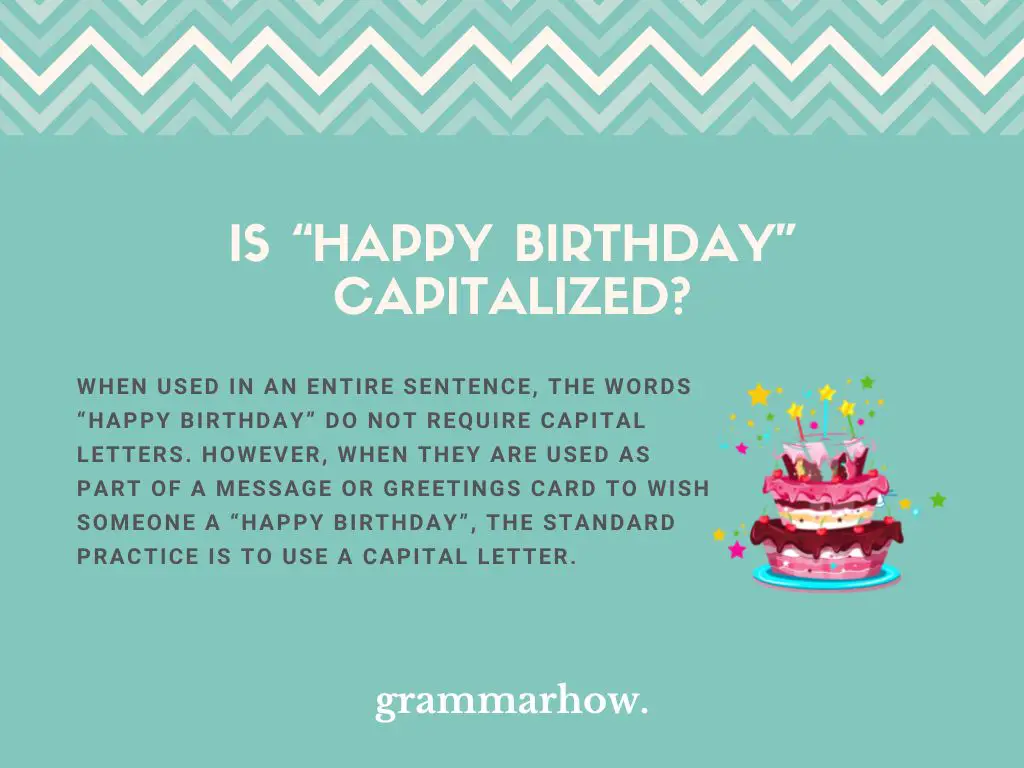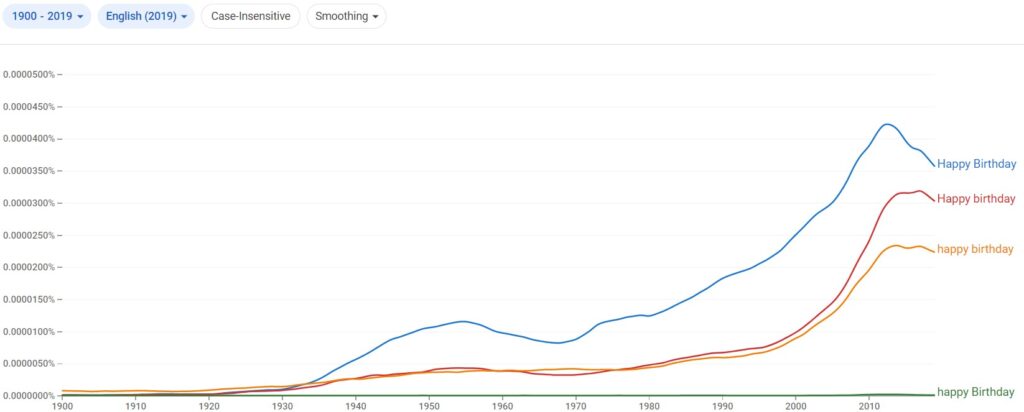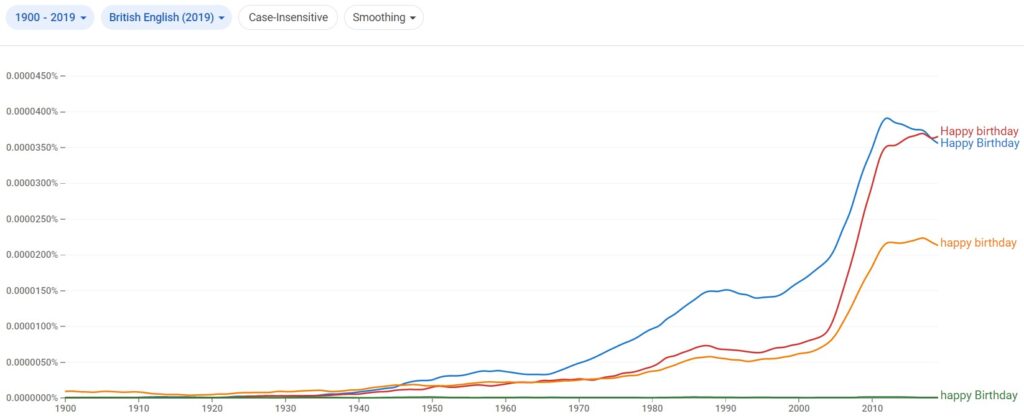You will have seen the phrase “Happy Birthday” written both with and without capital letters or combining both. This page looks at whether “Happy Birthday” should be capitalized and whether it is more common to use capitals.
Is “Happy Birthday” Capitalized?
When used in an entire sentence, the words “happy birthday” do not require capital letters. However, when they are used as part of a message or greetings card to wish someone a “Happy Birthday”, the standard practice is to use a capital letter.

Technically it goes against capitalization rules to capitalize “happy birthday” because neither is a proper noun. However, it is more common than not for people to use capital letters when sending messages of congratulation.
On greetings cards, for example, sometimes the entire message is in capital letters, and it wouldn’t be uncommon to see sentences like:
- Wishing You A Happy Birthday
- Hoping That You Have A Happy Birthday
When using the words “happy birthday” as part of a longer sentence or text, there is no reason to use a capital letter.
For example:
- He didn’t have a very happy birthday because he lost his job.
- I want to try and have a happy birthday this year instead of a lonely one like last year.
The Chicago Style Manual states that in a sentence in published literature, only the first word would use a capital:
- “Happy birthday, John!” The guests shouted as he walked through the door.
It goes on to state that as part of a personal greeting or message, you can use all capitals if desired.
- Wishing You Happy Birthday!
Happy Birthday
“Happy Birthday” is commonly used as a message of felicitation sent on someone’s birthday. Often people simply send the message “Happy Birthday”, in which case both words tend to have capital letters, or they may send a longer message like “I hope you have a Happy Birthday!”
According to the Chicago Style Guide and the general consensus, it is acceptable to capitalize both words as part of personal messages and greetings, or if you wish, capitalize all words. Also, the song “Happy Birthday” would use capital letters.
Here are some examples of “Happy Birthday” in a sentence:
- Have a Happy Birthday!
- I hope you have a really Happy Birthday!
- Happy Birthday, Pauline!
- We sang Happy Birthday, but he didn’t look impressed.
Happy birthday
“Happy birthday” is the more grammatically “correct” version of the spelling that would be used in literature. This is because the first word of the sentence has a capital letter, and the “birthday” doesn’t because it isn’t a proper noun.
People tend to use a mixture of “Happy birthday” and “Happy Birthday” for personal messages, and both are correct.
Here are some examples of how “Happy birthday” could be used in a sentence:
- “Happy birthday Paul!” the excited guests shouted as he walked into the room.
- “Happy birthday” is sometimes not easy to say when you don’t know the person well.
- Happy birthday Jack! I hope you have a great day.
happy Birthday
The term “happy Birthday” is not grammatically “correct” because the word “birthday” is not a proper noun. However, many people assume it is, and people often use different styling and formats as part of birthday messages. Therefore, using a capital “B” on “Birthday” is widely accepted as a “rule” that can be and is consistently broken.
Here is how the term would look in a sentence:
- I hope you have a happy Birthday!
- Tell your Dad I hope he has a happy Birthday!
- Wishing you a really happy Birthday for this Sunday. Have a great day!
happy birthday
The term “happy birthday” with neither word capitalized is correct when used in the middle of a sentence. Some people may also use it for greetings messages, but it is more common to have capital letters for greetings and short snappy messages.
Here are some examples of how “happy birthday” can be used in a sentence:
- We all wished him a happy birthday, and I think he seemed pleased.
- To be honest, she didn’t look like she had a very happy birthday.
- Having a happy birthday gets less and less likely the older I get.
Which Is Used the Most?
The Google Ngram Viewer shows that since the 1930s, the most common version of the spelling is “Happy Birthday.” However, since the 1990s, there has been growth in the version “Happy birthday”, which is now almost as frequent as “Happy Birthday”, whilst “happy birthday” is not too far behind.

The Google Ngram for the UK shows that “Happy birthday” has become slightly more popular than “Happy Birthday”. However, these statistics obviously do not account for personal text messages and social media posts, which may dramatically skew the results.

Final Thoughts
It is perfectly acceptable, but not required, to use capital letters on “Happy Birthday” in messages of congratulations or on greetings cards. However, when used as part of a more significant, complete sentence, “happy birthday” should be used because neither word is a proper noun.

Martin holds a Master’s degree in Finance and International Business. He has six years of experience in professional communication with clients, executives, and colleagues. Furthermore, he has teaching experience from Aarhus University. Martin has been featured as an expert in communication and teaching on Forbes and Shopify. Read more about Martin here.
